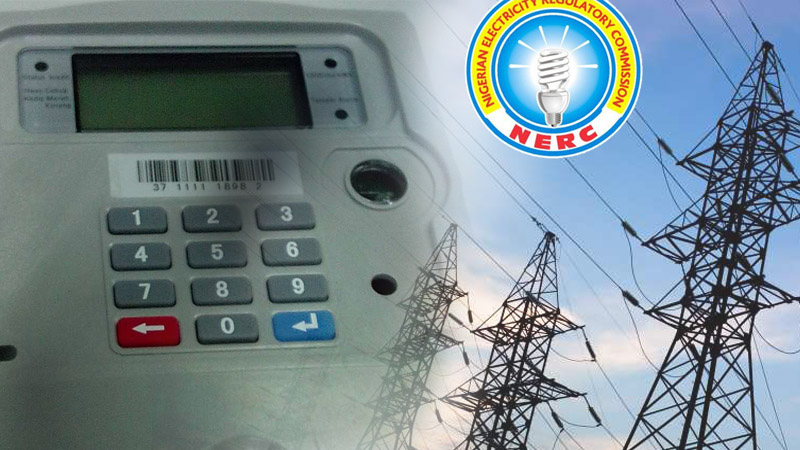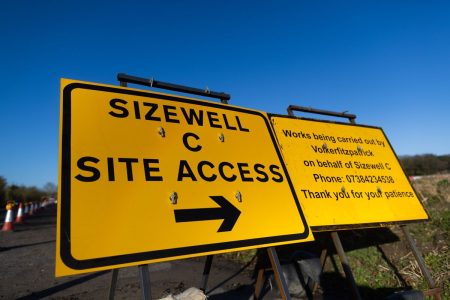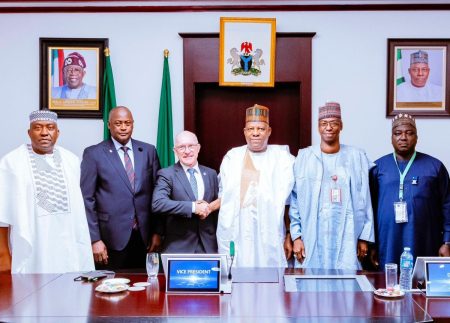
OpeOluwani Akintayo
25 May 2018, Sweetcrude, Lagos – Mojec has been dropped from the list of 22 firms granted ‘No Objection’ licenses by the Nigerian Electricity Regulatory Commission, NERC, to participate in the meter procurement under the Meter Asset Provider, MAP, Regulation 2018.
Established in 1985 and ranked among the top three Nigerian companies operating in the electricity meter manufacturing sub-sector, Mojec has worked with almost all electricity distribution companies in Nigeria as meter manufacturer, likewise in power generation and transmission sector.
In a statement by NERC on Wednesday, the commission said the successful 22 selected firms were chosen after it called for applications from interested investors, after which it did “due diligence” on the applications.
MAP regulations is to facilitate closure of the wide metering gap in the Nigeria Electricity Supply Industry, NESI, within three years.
According to NERC, the No Objection license is to qualified intending investors to participate in the meter procurement process in NESI, adding that it is in line with Section 8 (4) of MAP Regulation.
“Members of the public and intending investors should please note that the publication of these applicants does not foreclose other interested applicants from the ‘No Objection’ as it is a continuous exercise”.
Companies granted ‘No Objection’ licenses include Huawei Technology Company Nigeria Ltd; Bilview Energy Ltd; Chintech Electro Nigeria Ltd; Holley Metering Ltd; Meron Nigeria Ltd; Integrated Power Ltd; MBH Power Ltd; and Trimani Engineering Ltd.
Others are Imperial Infrastructure Development Company Ltd; Ratio Consulting Limited; Protogy Global Services Ltd; Paktim Metering Nigeria Ltd; Sabrud Consortium Nigeria Ltd; Tinuten Nigeria Ltd; Kayz Consortium Ltd; and BTS Power Ltd, Sapropel Energy Resources Ltd; Megawatt Distribution International Ltd; Unistar Hi-Tech Systems Ltd; and MOMAS Electricity Meters Manufacturing Company Ltd; CIG Metering Assets Nig. Ltd and Cresthill Energy Ltd.
Mojec was missing from the list.
Yet, as shocking as the development is, SweetcrudeReports’ investigation as far back January could be the reason behind Mojec being dropped from the new list of meter providers companies.
NERC published two lists: the first contained just 22 firms which it said were newly approved. The second list contained 138 firms, including two licenses to Nigerian Electricity Supply Corporation (NESCO) Ltd and AES Nigeria Barges Ltd, granted by the Ministry of Power and Steel in 2000, prior to the establishment of NERC, to expire in 2025. This means their licenses should last for 25 years.
However, on the list, although that of AES Nigeria Barges Ltd was issued in 2000 and should expire in 2025 yet, NERC said its license had already expired, bringing to question on what parameters were the 138 firms cut down to 22 firms.
Even NESCO’s name which NERC said its license is still “in operation” on one of the lists, has been quietly dropped by the commission as the name was not reflected on the list of the 22 approved.
Likewise, one of the most touted local meter manufacturing companies, Mojec has been dropped from both lists published by NERC.
Mojec was previously among the 2015 meter providers contract list seen by SweetcrudeReports.
In a report titled ‘Buhari to revive approved N27b metering contract abandoned by Obasanjo, Jonathan since 2015’ by SweetcrudeReports’ in January, revealed plan by this administration to bring back the abandoned metering plan.
In the document obtained, over N27 billion was approved for Ziklagsis Network Limited, Mojec International Limited, and others by Jonathan’s administration in 2015, for the supply of 753,002 meters.
The project which was started and abandoned by the Obasanjo’s administration was later revived by Jonathan.
According to the document, money totaling N 27,108,072 billion was approved by the Federal Executive Council, FEC under the Jonathan’s Presidential Initiatives to Nigerians.
Breakdown of the contract showed that N4, 983, 022 was approved to Ziklagsis for the supply of 226, 501 single phase meters at the rate of N22, 000 each as at that time, totaling N4, 983, 022, and N11,325,050 billion for 226,501 meters at N50,000 each at that time, totaling N11,325,050. Total money approved for Ziklagsis was N 16,308,072.
Mojec had a contract to supply 30, 000 single phase meters for N22, 000 each (N660 million) and 30, 000 pieces of 3 phrase meters for N50, 000 each (N1,500 billion). Total money approved for the company was N2, 160 billion.
Electricity Meter Company Nigeria PLC got an approval to supply 20, 000 single phase and 20, 000 3-phase meters at N22, 000 each (N440 billion) and N50, 000 each (N1 billion) respectively. A total of N1, 440 billion was approved for the company.
Nomas Electricity Meters was supposed to supply 35,000 pieces of single phase meters, and 35, 000 3-phase meters at N22, 000 each (N770 billion)and N50, 000 each (N1,750 billion) respectively. Total of N2, 520 billion was approved for the company.
Interestingly, checks revealed that Normas Electricity Meters is not a registered company with the CAC.
However, upon further checks, we found one MOMAS Electricity Meters Manufacturing Company Limited, Surulere, Lagos, registration number 991359, registered in 2011 but we were unable to ascertain whether ‘MOMAS’ was mistakenly spelled as ‘Nomas’ in the document.
Worthy of note, the list of newly approved 22 firms, also included MOMAS Electricity Meters Manufacturing Company Ltd.
The fifth company, Unistar Hi-Tech Systems Limited was to supply 25, 000 single phase meters at N22, 000 each (N550 billion), and 25,000 3-phase meters at N50, 000 each (N1,250 billion). The firm got a total of N1, 800 billion for the supply.
ENL Consortium Limited, Kado Estate, Abuja, CAC registration number 441342, 2002, got an approval of NN1, 606 billion to supply 23, 000 single phase meters and 23, 000 3-phase meters at N22, 000 each (N506 billion) and N50, 000 each (N1100 billion)respectively.
While Lysa Or-Tech Nigeria Limited got an approval of N12, 274 billion to supply 17, 000 single phase meters at N22, 000 each (N374 billion) and 17, 000 pieces of 3-phase meters at N50, 000 each (N900 billion). Total money approved for the firm was N1, 274 billion.
The total amount approved for the metering project was N27, 108, 072 billion.
According to investigation, the metering project was to be funded from the Eurobond USD 200 million/U.SD 88.6 million sale proceeds from the NIPP Power Plants.
SweetcrudeReports later learned that since the contract was signed during Jonathan’s administration, Buhari no longer had the intention of using the funds from the sale in procuring meters as planned.
However, in August last year, government approved an N39bn loan to DISCOs for the supply of meters.
Again, SweetcrudeReports had reported that governmentad agreed with the DisCos NERC to deregulate the metering process and that the plan was being worked out by NERC, to take effect any time from this year.
Under this system, customers who cannot wait for their turns on the DisCos metering plan, can independently buy meters from likewise independent but licensed meter manufacturers who sell at competitive prices to customers, while at the same time reducing the burden on the DisCos.
This also translates to the DisCos will no longer go through the burden of importing meters at higher costs: this is particularly true as none of the electricity distribution companies’ name is on the new list of meter providers by NERC, confirming our investigation in January.
When SweetcrudeReports reached out to spokesperson for Niger Delta Power Holding Company, NDPHC who runs the NIPP, Yakub Lawal in January, to find out whether fund to be realised from sale of the plants would still be spent on metering as planned, he denied ever being in the know of any approval of any N27billion for supply of meters in the first instance.
In a telephone interview with SweetcrudeReports, he had argued that there would be no need for government to set aside any money for meter procurement since the distribution arm of the power sector had been privatised.
“There was no such approval by Jonathan. Besides, the federal government alone cannot decide what to use money got from NIPP sale for when the plants are being run by the three tiers of government”.
“To the best of my knowledge, the NIPP power plants are yet to be sold. And even whenever they end up being sold, the government has other infrastructural projects to spend the fund on and not on metering.”
“On what basis should the federal government buy meters for the discos? So, I am not aware of any money from NIPP to buy meters,” he said.
In a counter-reaction, Managing Director, Mojec, Chantelle Abdul, had confirmed to SweetcrudeReports that money was indeed approved but not released.
She added that the contract could not commence due to some “misunderstanding”(which she refused to disclose) with one woman whom she simply identified as Rose.
During our interaction with her, she tried to dissociate Mojec International from the issue, saying the woman in question (Rose) to whom the contract was originally awarded is not from Mojec. “The project is not a Mojec contract”.
However, the document obtained in January specifically stated that supply of 30, 000 single phase meters for N22, 000 each (N660 million), and 30, 000 pieces of 3 phrase meters for N50, 000 each (N1,500 billion), a total of N2, 160 billion was approved to Mojec International Limited.
According to her, the woman (Rose), had sued the Obasanjo and Jonathan’s regime, including the Ministry of Power, and the then Attorney General of the Federation from proceeding with the project.
“Regardless of whoever was awarded the contract, it was just a paper award. No money was released for it. There was a misunderstanding and the woman to whom it was awarded to, sued about five ministries stopping them from executing it. So the project never happened.”
“Unfortunately, I am not the driver of the project so can’t tell you what’s really going on about it,” she said.
Sources told SweetcrudeReports in confidence that Mojec not making the new list of meter providers could be as a result of the misunderstanding and court case the firm had filed against past administrations, the ministry of power and the then attorney general of the federation.



